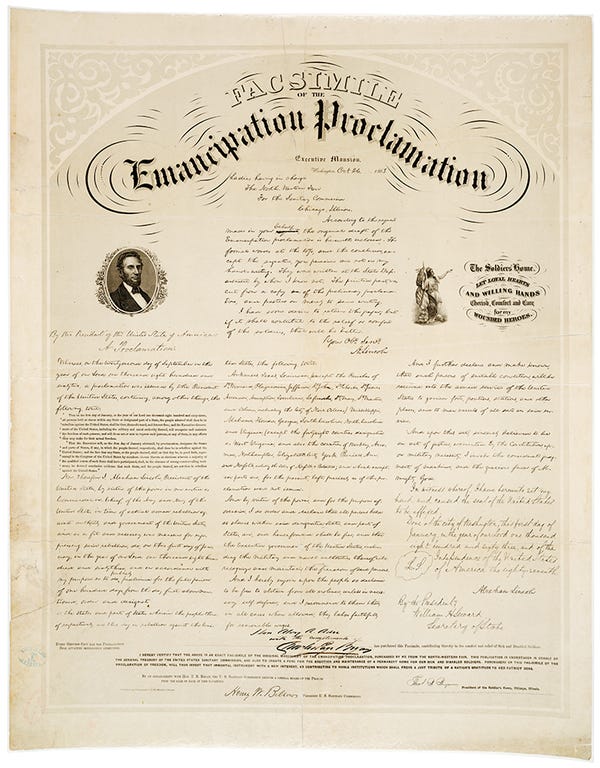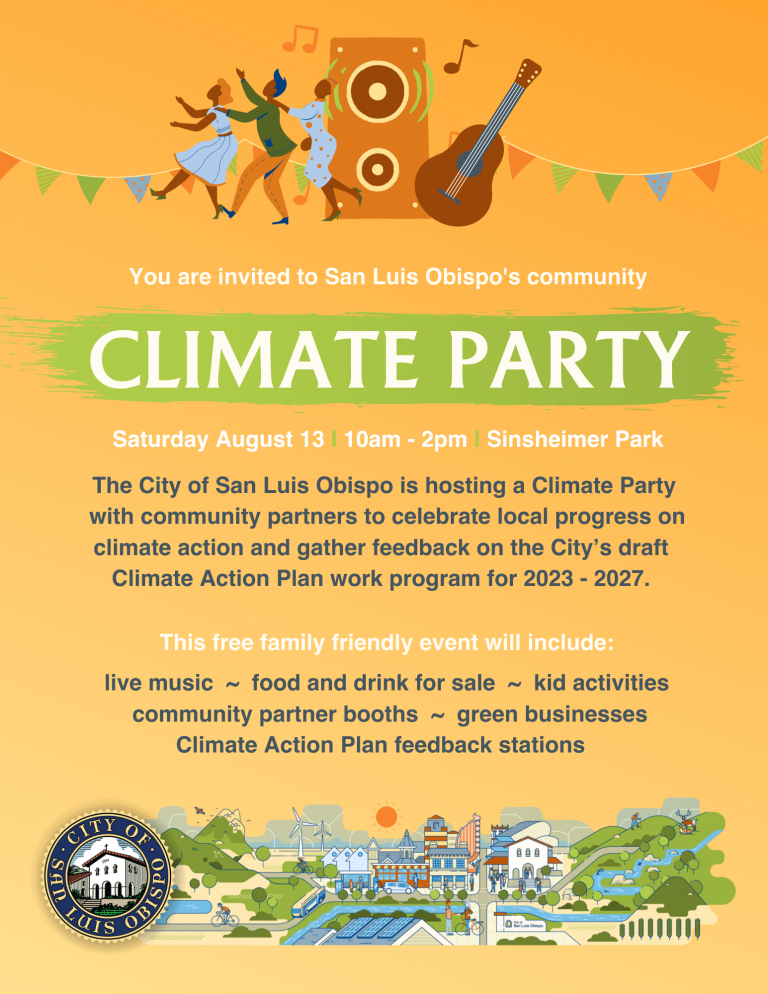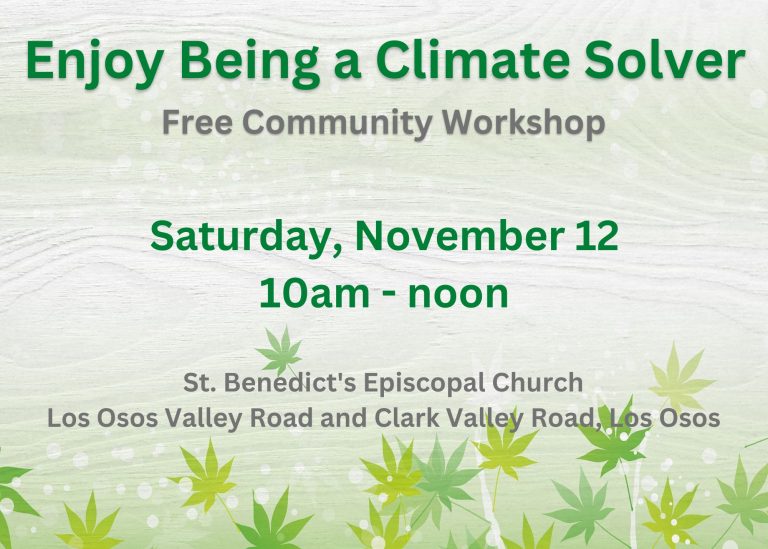What Juneteenth has to teach us about the intersection of race and climate

On Saturday June 17th 2023 from 11AM to 5PM in Mission Plaza, SLO County NAACP will be hosting this year’s local Juneteenth Celebration where the SLO Climate Coalition and R.A.C.E. Matters SLO are coming together to spread the word about climate action you can take.
Sharing this space with SLO Climate Coalition at Juneteenth is important for our community. I think just being connected, this will serve us greatly in the climate space, and we bring to the table how we work with the community for the SLO Climate Coalition.
Board President Preston Allen, R.A.C.E. Matters SLO

US National Archives Records Administration
Recognized as a federal holiday in 2021, Juneteenth is the anniversary of emancipation in the United States. In January of 1863, the Emancipation Proclamation went into effect, freeing in word every enslaved person in the Confederate states. Union soldiers spread the news as they fought through the South. However, not everyone was free yet. It wasn’t until the Union army reached the outer edge of Confederate control when they marched into Galveston Bay in western Texas and informed the enslaved peoples of their freedom, that the promise of the Emancipation Proclamation was fully realized. This momentous occasion took place on June nineteenth, 1865, two and a half years after the Emancipation Proclamation was signed.
The people who had waited for freedom for so long commemorated the day as Juneteenth.
Enslavement of African peoples in the colonies that would become the United States began in 1619, when British privateers brought captured Angolans to Virginia. For over two hundred years the trade in human lives persisted, founded on a false narrative of European superiority which ignored the richness and culture of African civilizations dating back to at least 5000 B.C.E. After the slave trade ended and the Emancipation Proclamation came into full effect, America’s newly free population experienced a tumultuous time known as Reconstruction. During this period, there were many attempts to reform the systems which had supported slavery in the United States. The Freedmen’s Bureau was set up to assist newly-emancipated people with pursuing citizenship, legalizing marriages, and pursuing other legal rights previously denied them. However, due to resistance from white landowners and politicians in the former Confederacy, many of the reforms attempted during Reconstruction ultimately failed to achieve their goals.
Just as the Emancipation Proclamation did not bring freedom equally for all enslaved people in the Confederacy, subsequent legal and political decisions promising more rights, benefits, and assistance were not always realized or applied equally. Because of this lack of follow-through and entrenched racism in the U.S. government and social systems, racial inequality persisted through the Reconstruction period and afterwards.

The legacy of slavery and oppression by colonial powers continues today, even in the text of the thirteenth amendment used to free all slaves in the United States during Reconstruction: “Neither slavery nor involuntary servitude, except as a punishment for crime whereof the party shall have been duly convicted, shall exist within the United States, or any place subject to their jurisdiction.” [Italics added]. It is this system of indentured servitude imposed on prisoners, known as forced-labor that remains legal and disproportionately impacts black, brown, and Indigenous people. In California, this legacy intersects with the dangers of climate change: our state has a history of utilizing incarcerated laborers to fight fires, including the wildfires which grow worse and worse as climate change progresses. This system of continued involuntary servitude is only one aspect of the persistence of racial inequity in the United States: people of color face higher barriers to accessing healthcare, income parity, and housing. The term “redlining” is used to describe how institutional and systemic racism have shaped neighborhoods and communities, pushing people of color out of certain areas and placing environmentally harmful industries in neighborhoods populated by people of color.
This practice of disproportionately exposing communities of color to more toxins and environmental hazards than other communities is known as environmental racism. Race is the number one predictor of whether a facility that produces harmful industrial waste will be sited in a community.
However, since the 1980s there has been growing attention in the United States on environmental justice. Environmental justice is the idea that all people, regardless of socioeconomic status, deserve access to clean air, clean water, and healthy spaces. This movement has given rise to the climate justice movement, which focuses on global impacts caused by local decisions and holds to many of the same principles as the EJ movement. There are many community organizations across the United States which focus on climate and environmental justice issues and providing access to clean, safe, and affordable drinking water, food, air, and green space. As temperatures continue to climb and we begin to see the effects of sea level rise and changing weather patterns, many organizations are also pushing for climate equity. They advocate for the rights of all people to protection from extreme heat events, fire, flooding, and other hazards which are becoming more common as climate change impacts worsen. These organizations, such as the NAACP work with people who tend to be more vulnerable to climate and environmental hazards.


Locally, R.A.C.E Matters SLO and the SLO Climate Coalition are working together to ensure that vulnerable residents of San Luis Obispo County are not left out of climate change adaptation conversations regardless of race. As Preston Allen, Board President of R.A.C.E. Matters SLO puts it, “When it comes to the climate conversation, oftentimes the message doesn’t get through to people of color in particular and that disadvantages them.” After all, how can people be prepared for changes they don’t know are coming or participate meaningfully and have self-determination in a future they are being left out of building?
Communicating about the impacts of climate change and what we can do to prepare for them is critical to ensuring that no one will be left to shoulder disproportionate impacts. To get the word out to historically marginalized and overburdened communities, R.A.C.E. Matters SLO is partnering with the SLO Climate Coalition. Vickie Prothro, Equity Advisor for the SLO Climate Coalition, says, “It is the responsibility of this organization to be intentional in sharing resources with communities that are traditionally excluded.”
People need to know that gas cooking is sort of going away. We don’t want the only people with gas to be Black people who then can’t get it repaired and then they can’t eat.
Board President Preston Allen, R.A.C.E. Matters SLO
Some of the campaigns that SLO Climate Coalition and R.A.C.E. Matters SLO are working on together include providing information on the upfront subsidies and tax rebates Americans are eligible for under the Inflation Reduction Act and implementing climate and environmental education in R.A.C.E Matters SLO’s family-focused programs. R.A.C.E. Matters SLO is working with the city on a grant for electrification and Board President Preston Allen says, “People need to know that gas cooking is sort of going away. We don’t want the only people with gas to be Black people who then can’t get it repaired and then they can’t eat. So we want to be included and involved in those conversations… We want to get out ahead of these issues. Our groups are trying to influence policies and procedures in the climate and political arena and saying we’ve got to make sure that everyone is brought along.”

R.A.C.E Matters SLO is also working to improve climate literacy within their organization. “We decided as an organization that we wouldn’t just point to things by providing a link, saying ‘here it is, check it out,’ but really dive in ourselves and understand the things that we think it’s important for people to understand.” Preston says. “Sharing this space with SLO Climate Coalition at Juneteenth is important for our community. I think just being connected, this will serve us greatly in the climate space, and we bring to the table how we work with the community for the SLO Climate Coalition.”
Partnerships like this are critical in ensuring that it is not only the racially and economically privileged who have opportunities for economic and physical security in the face of worsening climate impacts.
Juneteenth is about the realization of freedom for those who waited longer than anyone else. Their rights were delayed and denied by the Confederate states, and later as Reconstruction faltered, denied by white politicians and powerful social figures. They were left out of the future – left out of opportunities to build wealth, own property, and vote. Today, there are many conversations happening about what the future looks like and how we should approach life in a changing world – and these conversations need to include everyone. That means taking information to the communities who have historically been kept in the dark and making opportunities to participate in and benefit from climate change adaptation accessible to those who have been denied in the past.
“What’s happening is that the world is moving forward with various community-focused climate actions and solutions and there are a lot of underrepresented communities and individuals who see what is happening but don’t see how they can get involved, don’t see how they can step in.”
Vickie Prothro, SLO Climate Coalition
This Juneteenth, YOU are invited in! Come to the Mission San Luis Obispo de Tolosa plaza on the 17th between 11AM and 5PM to talk to R.A.C.E Matters SLO and the SLO Climate Coalition or visit us at our websites: R.A.C.E Matters SLO and SLO Climate Coalition.
This article was researched and written on the unceded ancestral lands of the Salinan Tribe /the T‘epot’aha’l, “People of the Oaks” and yak titʸu titʸu yak tiłhini (ytt) the Northern Chumash People.



